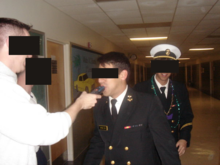
Sobriety is the condition of not having any effects from alcohol or drugs.[1] Sobriety is also considered to be the natural state of a human being at birth. A person in a state of sobriety is considered sober. Organizations of the temperance movement have encouraged sobriety as being normative in society.[2]
In a treatment setting, sobriety is the achieved goal of independence from consuming alcohol. As such, sustained abstinence is a prerequisite for sobriety. Early in abstinence, residual effects of alcohol consumption can preclude sobriety. These effects are labeled "PAWS," or "post-acute-withdrawal syndrome." Someone who abstains, but has a latent desire to resume use, is termed a "Dry drunk" and not considered truly sober. An abstainer may be subconsciously motivated to resume alcohol consumption, but for a variety of reasons, abstains (e.g. a medical or legal concern precluding use).[3]
Sobriety has more specific meanings within specific contexts, such as the culture of many substance use recovery programs, law enforcement, and some schools of psychology. In some cases, sobriety implies the achievement of "life balance."[4]
YouTube Encyclopedic
-
1/5Views:15 11040 13011 9707 85617 660
-
What are the 5 ENEMIES of your Sobriety??? - (Episode 146)
-
The BEST ADVICE For Early SOBRIETY! :::22 TIPS::: (Episode 152)
-
A former HEAVY DRINKER answers "IS SOBRIETY WORTH IT?" - (Episode 170)
-
Why isn't SOBRIETY making me HAPPY??? - (Episode 154)
-
WHAT'S THE POINT OF GETTING SOBER??? (Episode 185) #sober #sobercurious #sobriety #quittingalcohol
Transcription
Sober curious
Sober curious is a cultural movement and lifestyle of practicing none or limited alcohol consumption that started spreading in the late 2010s, in particular among people from the millennials generation.
Sober curiosity is often defined as having the option to question or change one's drinking habits, for mental or physical health reasons.[5] It may be practised in many ways, ranging from complete abstinence to thinking more about when and how much one actually wants to drink.[6]
Recovery support programs
Sobriety may refer to being clear of immediate or residual effects of any mind-altering substances. Colloquially, it may refer to a specific substance that is the concern of a particular recovery support program[7] (e.g. alcohol, marijuana, opiates, or tobacco). "Clean and sober" is a commonly used phrase, which refers to someone having an extended period without alcohol or other drugs in their body.
Recovery can start in many different ways for all people. One may go to rehab, a detox center or engage a sober companion to start. The next recovery support program may be slightly more difficult to find. Sober living can be confusing using any generic search engine. Recovery resources exist for many different companies, mainly across the United States.
Alcoholics can also use books, podcasts and online resources to help their own recovery.
Temperance organizations
Organizations of the temperance movement have encouraged sobriety as being normative in society.[2] The Woman's Christian Temperance Union disseminates literature on the living a sober lifestyle,[8] while fraternal organisations such as the Independent Order of Rechabites and International Organisation of Good Templars provide a space for teetotalers to socialize.[9]
Law enforcement
Field sobriety tests and breathalyzer testing are two ways law enforcement officers often test for sobriety in a suspected high or drunk driver. In the US, these "standardized field sobriety tests" are at the officer's discretion. They can also administer other tests including blood and urine tests.[10] In other countries (for example The Netherlands), only breathalizer and blood testing is used. Standardized tests that can be performed in the US include:
- One-leg stand test
- Walk and turn test
- HGN (eye) test (horizontal gaze nystagmus test)
Non-standardized tests include:
- Romberg's test
- Finger-to-nose test
- Finger-count test
- Hand pat test
- Alphabet recitation test
- Counting numbers backwards
Since these tests rely on cooperation of the subject, the final result often depends on the presiding officer's interpretation. There are many factors that can lead to inaccuracies in sobriety testing including orthopedic or neurologic conditions, and fatigue.
See also
References
- ^ "WHO - Lexicon of drug terms published by the World Health Organization". www.who.int. Archived from the original on 4 July 2004.
- ^ a b Sonnenstuhl, William J. (31 May 2018). Working Sober: The Transformation of an Occupational Drinking Culture. Cornell University Press. p. 8. ISBN 978-1-5017-1121-3.
- ^ ""Scientific grounding for sobriety: Western experience." MD Basharin K.G., Yakutsk State University" (PDF). Archived (PDF) from the original on 8 May 2018. Retrieved 29 June 2011.
- ^ "TWELVE STEPS and TWELVE TRADITIONS" Archived 27 March 2012 at the Wayback Machine
- ^ What Does It Mean to Be Sober Curious? article by Sarah Sheppard, January 24, 2021, on verywellmind
- ^ Skål – uden alkohol, article by Eva Guld Boesen in Samvirke ISSN 0036-3944, February 2023, p. 18-27 (in Danish)
- ^ "Alcohol Support Groups - Alcohol Recovery Programs". Alcohol.org. Archived from the original on 15 April 2022. Retrieved 20 September 2020.
- ^ Chase, Fanny DuBois (1899). Glimpses of a Popular Movement; Or, Sketches of the W.C.T.U. of Pennsylvania. Leeds Press. p. 60.
- ^ Logan, Norma Davies (1983). "Drink and Society: Scotland 1870–1914" (PDF). University of Glasgow. p. 34. Archived (PDF) from the original on 14 June 2022. Retrieved 24 October 2020.
- ^ "Field Sobriety Tests". Archived from the original on 2 March 2022. Retrieved 7 July 2011.
External links
- Sobriety information website with links to several recovery organizations
- Sobriety information website and forum for Alcoholics and Narcotics Anonymous
- Wiktionary on the word
